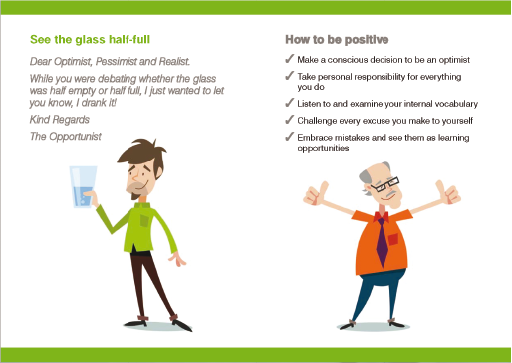2.4 Be realistic
If you are in the middle of a difficult and stressful time as you’re undertaking this course, you might not feel able to tackle all the goals you’ve identified at this point. There are times when just maintaining the status quo is all that is possible.
In this situation, a positive step forward is to choose one goal to focus on at this stage and then actively note the things you want to work on next, deciding to look at them again in two to six months’ time. In fact, that could become one of your goals – to revisit your plans for developing career resilience in six months, when things feel less overwhelming.
This type of positive thinking does not mean ignoring difficulties or the negative aspects of a situation, rather reviewing them objectively and using your problem-solving skills and strengths to generate solutions when you have time to apply them.
Another tactic is to take courage and ask for objective feedback from others. For example, after an unsuccessful job interview it can be easy to persuade yourself it was all a disaster. Having the courage to ask for feedback can help you obtain specific comments from an objective observer, even on weaker areas: ‘X and Y were great, but you gave weaker examples for Z’, or, ‘You did well but it was a very competitive field, and other candidates had several years more experience than you.’ Feedback is almost never as dire as our darkest imaginings, and fuels positive action.
Activity 5 The TV interview
Through the course you’ve watched several interviews with resilient individuals, just like you. In this activity you will be imagining that you are the interviewee. What could you say?
First recall three major events in your adult life. How did you change your behaviour as a result of them? This could be moving to a new area, taking on a major challenge, becoming a parent, responding to a health scare, and so on. Take some notes.
How might you finish these sentences?
- My tips to my younger self would be …
- I think I’m proudest of …
- The turning point came when …
You could even video your responses, if you wanted.
How does it feel to stand back from the events you have lived through, and major changes you have adapted to? How far does it help you to see yourself differently? This could be a useful exercise for promoting positive self-talk and boosting your self-esteem.

